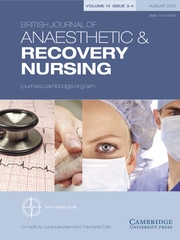No CrossRef data available.
Article contents
Editorial
Published online by Cambridge University Press: 03 June 2005
Abstract
- Type
- Editorial
- Information
- Copyright
- © 2005 Cambridge University Press
I have just been to New York, a great city if you ever get a chance to go, which inspired me to write this issues editorial. I went as part of my job. The centre for which I work is modeled on the Hospital for Special Surgery and a group of us went across to fill them in on what we have achieved so far. It was the first time I had seen the hospital, however what left a lasting impression was the way that the nurses communicated with each other, but not only that how they congratulated each other on their achievements. We were lucky enough to sit in on one of the meetings for the lead nurses for all the areas of the hospital. These were the nurses who lead the wards, preassessment, PACU and theatres. What impressed me most of all was the fact there was a buzz in the meeting and a lot of clapping. They congratulated one another by a round of applause. One was for having a poster presented at a conference. This group of nurses struck me as being dynamic and forward thinking and able to communicate well. They told me afterwards that this had taken them a while to get to this point but it had been worth it.
I have come back and had a think about this and how we as nurses in general communicate. I was with a patient the other day who was in pain and I told her to press her PCA button to get some analgesia. She said that she had not pressed it because she thought it was the nurse call button and she did not want to bother the nurses. I thought about this afterwards. Where I work we consider that we are good at giving patients information. PCA is discussed with them at the education class at preassessment, it is then discussed with them prior to surgery and we explain it to them when they come into PACU, but on this occasion we had obviously failed. So even when you think you have communicated something well you may not have done.
What I have learnt is that if you communicate well you may not do it as well as you think and instances like the one above serve to pull you up and re-evaluate what you do. In this instance I have ensured that prior to telling patients about their PCA I discuss with them what they understand by this and what they have been told.
As we enter 2005 we all make new year resolutions and most of us do not keep these! But mine this year is to communicate in a more meaningful way and check that the message has not got scrambled in the telling. Also I want to celebrate the success of my staff more. In the centre where I work we are approaching a year of being open. It has not been an easy year it has been challenging and we have made mistakes but above all we have achieved a significant amount and all staff must be congratulated for that, everyone has worked hard to facilitate things such as an average length of stay for hip and knee arthroplasty patients of 5 days which is a marvelous achievement. We have a PACU to be proud of and Advanced Practitioners who have taken on junior doctors roles with skill and confidence. A theatre department who admit the patients to on the day of surgery giving them all the necessary information to take them through the remainder of their stay. This is all something in nursing we should celebrate and be proud of.
I know that I sound like a broken record but all BARNA members must have something they want to celebrate, so am asking you to write to me and tell me about it. I find it sad that often the articles I get for the journal are not from BARNA members but people outside the organization and after all this is your journal, so PLEASE PLEASE PLEASE write something for me in 2005 and celebrate all the good things that I know you are doing.
Happy New year to you all.


